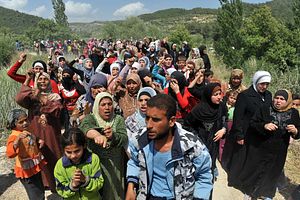Since the imposition of sanctions against Iran, 31.7 percent of arms exports to that country, representing a worth of $4.25 trillion, have been supplied by China. China’s deliveries to Iran have primarily consisted of HongQi-7 surface-to-air missile (SAM) systems and Crotale R440 SAMs. Only Russia delivered more arms to Iran; no other nation came close to matching that figure.
What’s more, Iran is second only to Russia in supplying arms to Syria, and from 2000 to 2014, 85 percent of the value of those arms came in the form of air defense systems and missiles.
In other words, Russia and China are the largest suppliers of air defense systems to Iran, while Russia and Iran are the largest suppliers of such systems to Syria. And because Iran is in cooperation with Syria regarding ballistic missile technology, by arming Iran China is effectively arming Syria too.
It’s no secret that Syria and Iraq are, as one writer observes, “awash with Russian, Iranian, and Chinese weapons.” Nor is it surprising that Syrian rebels have been found using Chinese missile technology. But this wasn’t a calculated outcome by the Chinese; it’s an unavoidable consequence of being one of the world’s biggest arms dealers.
However, China does have a choice when it comes to supplying Syria by proxy. Syrian President Bashar al-Assad has become responsible for the deadliest massacres of the Syrian Civil War. From January to July, his forces killed 7,894 people. That’s roughly seven times the number of people killed by the Islamic State during that time, which implies that the Syrian refugee crisis isn’t being caused by the Islamic State but by Assad’s bloody attempt to stay in power. Yet, unfazed by this bloodshed, China’s shop door remains open.
Worse still, on September 8, Xinhua declared, “The United States should take its responsibility in the disheartening refugee crisis in Europe as its controversial Middle East policies resulted in wars and chaos that displaced large numbers of people.”
The article closes, by saying that “as a solution, peace and stability should be established in the region. But it can not be done unless the United States shoulders its responsibility and corrects its mistakes.”
This sentiment has been echoed in People’s Daily. And while it’s true that U.S. intervention in the region has played an enormous role in bringing us to the present moment, it’s wrong to pretend China played no hand in this. China vetoed four U.N. resolutions to intervene in Syria. As Adrien Morin of The Diplomat writes:
The West finds itself frustrated by Chinese foreign policy pragmatism, or as the critics would have it, the absence of values. This is de facto incompatible with Western moral ideals, which invoke human rights or other ethical arguments. Chinese realpolitik is seen as amoral, if not immoral.
This doesn’t mean China is coldly indifferent to the suffering of Syrians. On the contrary, in June 2014 China donated $16 million in humanitarian aid for Syrian refugees. Rather, China prefers that other countries not meddle in its domestic affairs so it practices an ethic of reciprocity.
But the accusation that the U.S. is skirting its responsibility is lazy propaganda at best. The U.S. has contributed $4.11 billion in humanitarian aid for Syrian refugees, and more importantly, it isn’t indirectly supporting the man responsible for this crisis in the first place: Assad.
I’m not opposed to Chinese non-interventionism. I simply have a problem with claiming to practice non-intervention while selling more arms than almost any other country in the world, including to some of the nations involved in the conflict, then talking about who’s to blame while accepting no blame yourself.
































